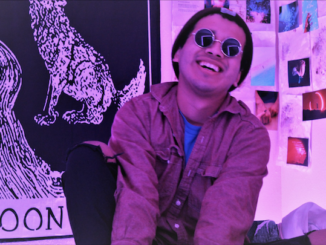
It’s relatable, it’s fun, it’s timeless.
Rock music has remained the most popular genre at Pepperdine University despite its unpopularity in today’s Billboard Hot 100 charts.
A Pepp Post poll of 105 students found that a majority of students, 61 percent, prefer rock over any other genre, narrowing edging out pop and alternative. Most students started listening to rock either from a parent, with a friend or from their own discovery.
“The first rock song that immediately struck home with me was ‘Come On’ by Chuck Berry,” junior philosophy major Jesse Hancock said. “I remember I was in the car with my friend Johnny, and he put it on and I had never heard it before. It just didn’t sound like any other music. It was just straight rock ’n roll.”
Rock and roll is thoughtful and turbulent, influencing other forms of music and people. It’s popularity ebbs and flows, and while some predict its demise, others believe the music will stay alive.
Rock history
Poll data showed that students are diverse in what music they listen to. Students want to listen to music that’s entertaining and reaches over a wide spectrum of cultures and themes.
Merriam-Webster defines rock as popular music usually played on electronically amplified instruments and characterized by a persistent, heavily accented beat and repetition of simple phrases.
Historically, rock evolved from country, folk and blues elements in the late 1940s, and continued to evolve until it became the most dominant genre in the music industry in the 1970s, longtime rock journalist Tim Grierson wrote in a November 2018 ThoughtCo article. Led Zeppelin invented “heavy metal” when they added darker themes and riffs to their songs. Pink Floyd added psychedelic flavors to their lyrics and the Sex Pistols and the Clash produced rock that was more simplified and rude: punk rock.
Rock further splintered in the 1980s with the rise of alternative rock, Grierson wrote.
Fewer and fewer artists continued to make rock as rock legends died out. Freddie Mercury died in 1991, George Harrison died in 2001, and David Bowie died in 2016, to name a few.
As rock regressed, indie and alternative music became more popular. Those genres are rock n’ rolls’ cousins.
Alternative rock featured distorted guitars and featured themes of dissatisfaction. Alternative rockers were more aggressive than “classic rockers” like The Beatles, Grierson said.
Merriam-Webster defines “indie” as music coming out of small independent labels producing sounds that sounded more grunge than rock itself.
Current artists under the rock umbrella lean toward indie and alternative music. Mac Demarco, a 21st century Canadian singer-songwriter, writes indie and psychedelic rock. He is taking old school rock and putting a new spin on it. Cage the Elephant, an American rock band, focuses more on the basics of classic rock but utilize quirky vocals from their lead singer, Matt Shultz.
Today, rap has largely surpassed rock. Though some older groups, like Rage Against the Machine, mixed them together, today rap stands on its own, said Buddy Deal, vice president of Promotion of Rock and Alternative at Hollywood Records/Walt Disney Co.
“I actually think that maybe there just hasn’t been as great rock music being made,” Deal said. “I think that it’ll come back around but that’s just where the focus is right now with rap and rhythm and blues.”
Scot Finck, vice president of Promotions at Hollywood Records/Walt Disney Co., said there is no decade that represents one specific genre.
“Reflect on this historically, there is no such thing as one music dominating a time,” Finck said. “How did we get all the way from Baroque to rock and now beyond and part of that has been the development of instruments.”
Rock has declined as technology how allowed artists to make music on their laptops instead of a guitar, Ronald Shannon Jackson, an American jazz drummer and composer, wrote on his website.
Electronic dance music has the same intense riffs and sound as rock music does, but it’s produced with laptops, not instruments. As technology continues to develop, so will music. Like rock, it has continued to evolve, DJ artist Tiësto said in an interview October 2015 with CNN.
“They’ve been asking me that since 1994, ‘is [EDM] going to end?’” Tiësto said. “I always say I don’t know. It keeps evolving, every year something new comes up, and now it’s at the highest it ever has been, so now I don’t know how much higher and how much better it’ll get.”
Rock rebellion
Great Books Professor Paul J. Contino said he discovered rock when he saw the Beatles on the Ed Sullivan Show and then a classmate brought the album to school the next day. As the 1960s continued, he noticed a growing generation gap.
For Christmas in 1969, he received the first album by Crosby, Stills & Nash. His mom didn’t like the lyrics.
“She found something objectionable – to this day, I don’t know quite what,” Contino said. “She asked me to return it to Korvette’s, where one bought records in those days. So I exchanged it for Led Zeppelin II – probably not quite the exchange my dear Mom had had in mind.”
Rock music has stayed relevant to teenagers and young adults due to its rebellious nature. DJ Ennis, vice president of Pop Promotion at Hollywood Records/Walt Disney Co., thinks that bands that have something to say to their audiences are going to stick around and continue the legacy of rock music.
“You know back in the ‘60s, you know, with the Vietnam War and everything going on,” Ennis said. “There was a significant amount of music that became popular music that was, you know, anti-war and anti-government that was about everything those kids were dealing with.”
Rock music was the only popular genre that “specifically addressed and was tailored to teenagers, there had been adult records and kiddie records, but nothing for that burgeoning bulge of the baby-boom population caught between childhood and adulthood,” Robert Palmer wrote in a April 1990 RollingStone article.
In addition, “rock & roll enabled ‘marginal’ Americans, poor white sharecroppers and black ghetto youths, the opportunity to express themselves freely, not as purveyors of rhythm and blues and country and western, whose audiences were limited, but as a dominant force in the popular marketplace,” Palmer wrote.
Not all adults grew up listening to rock music. Communication Professor Chris Stivers, the musical director of Songfest for more than 40 years, grew up listening to classical music. He got into rock as a young adult when he began playing in President Andrew K. Benton’s band.
“I just didn’t like rock ‘n roll,” Stivers said. “You know I felt offended by it. I thought I just don’t want to listen to this trash. It wasn’t until way after college that I was invited to play in a band. We had to play all of these songs. I was handed a sheet with words on it and notes above them and told to just play it.”
Stivers said is grateful that he was exposed to it. He no longer feels like he’s an outsider in the rock-loving community as he did as a child.
Predicting rock’s death
Some 62 percent of students believe that rock music won’t die out.
Students said they still listen to rock music because they understand each song possesses the blueprints of the music people listen to today. They see the creativity and patience each artist had with the music.
Junior communication major Cameron Meek said she respected the authenticity and craft rock music represents.
“Older music was way more complicated to write and produce because now you can do everything electronically and it’s easy but like back then it was super hard to create a huge album and put it out there,” Meek said. “I think the voices back then were way better without all the autotune.”
Contino said he wonders whether it’s becoming harder to invent new riffs or melodies.
“Sometimes it seems like almost everything’s been done already,” Contino said. “In the latter part of the 60s, there was so much experimentation. … I discovered FM radio around 1969 and that was where DJs would play seven- to 10-minute songs, or whole sides of records. It was a great time to discover music.”
The boss of rock, Bruce Springsteen, later became one of his favorites, fueling his love of rock still today.
Liz Hiles, a junior philosophy and religion major, said music is like fashion, it goes in and out of style.
“Trends are constantly revolving,” Hiles said. “What my mom always says is to keep a pair of your bell bottoms because they’re always going to come back. It’s just a cycle.”
On the other hand, 10 percent of students do think rock will die out.
Rock music is no longer the most popular genre. Genres like EDM and rap are becoming more universal to students around the world.
Justin Rorick, a sophomore sport administration major, thinks electronic dance music is the future of popular music.
“Music, especially EDM, is universal,” Rorick said. “Someone in China can hear the same thing you do. There’s no accents in music without lyrics. Being able to brand those in different countries and collaborate with different artists in different countries gives you that in to that particular country. Where as if you’re an American artist that never collaborates with anyone you’re never going to get those fans in that country.”
Keeping rock music alive
Hiles believes rock music will make a come back because of its authenticity. Audiences aren’t so into “mindless music” anymore. They want something that says something and can touch them. She added that classic rock influences current artists today.
“I still kinda think it will survive through trends and as a sort of reminiscence of the past,” Hiles said. “It still influences musicians today like one of my favorite quotes is Mac Demarco using 80s influence and style saying ‘I guess I wasn’t born in the 80s either so I’m also just a huge poser.’”
Rock artists like Cage the Elephant are relevant because they don’t feature overproduction, there isn’t a hidden agenda, Carino Ortiz wrote in a July 2017 Affinity. Artists just write songs about their emotions and fans respond to that with passion.
Clayton Hill, junior political science major, said rock will only stand the test of time if it successfully competes against current genres and attract younger generations.
“I think there’s a need for it so there is a diverse music industry,” Hill said. “I still like rock.”
Natalie Bishop completed the reporting for this story in Jour 241 in Fall 2021 under the supervision of Dr. Christina Littlefield and Dr. Theresa de los Santos. Dr. Littlefield supervised the web version of the story.




